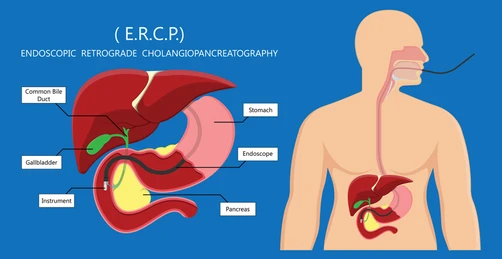
The Definition of ERCP Treatment
Book your appointment now with Dr. Vineet Chaudhari who provides the Best ERCP Treatment in Kalyan. The Endoscopic Retrograde Cholangiopancreatography (ERCP) procedure is used to identify and treat problems related to the liver, gallbladder, pancreas, and bile ducts. An endoscope, a long, flexible tube with light at the front, is connected with the ERCP scope to provide fluoroscopy, an X-ray imaging function. A gastroenterologist guides the scope through the stomach, oesophagus, and first segment of the small intestine. Once the doctor has examined these organs to determine whether there are any problems, a thin, flexible tube known as a catheter will be put through the scope to inject a dye. This highlights the organs on the X-ray.
Procedure
The ERCP process takes between thirty and sixty minutes. The following actions are involved:
What Happens After ERCP?
You will be observed for one to two hours in a recovery room following your ERCP procedure. There can be a brief pain in your throat. To ease the pain, suck on lozenges for the throat. After the procedure, you have to be driven home by a competent adult. It is also advised that you have someone accompany you for a full day following the surgery. Therefore get in touch with us because Dr. Vineet Provides the Best ERCP Treatment in Kalyan.
Take at least eight hours off from operating machinery or driving. It is advised that you spend the night within a 30-minute drive of the hospital in order to facilitate a prompt trip to the emergency room for evaluation, should the need arise. Your primary care physician or the physician you were referred to will review the results of the ERCP test with you.
Complications
With up to 5% of instances experiencing this problem, it is the most frequent one. It is characterised by pancreatic inflammation and can be moderate to severe, necessitating hospitalisation. Doctor Vineet Provides the Best ERCP Treatment in Kalyan.
Bleeding may occur during ERCP, either internally in the gastrointestinal system or at the operation site. Severe bleeding could need for more care, although small bleeding might stop on its own.
Rarely, ERCP can result in a gastrointestinal tract perforation or tear that needs to be surgically repaired.
Despite being rare, ERCP involves a risk of infection, especially when devices are inserted into the pancreatic or bile ducts.
Since ERCP is usually done under anaesthesia or sedation, there is a chance that these drugs will have unfavourable side effects, such as allergic responses or respiratory depression.
Sometimes ERCP might result in a bacterial infection of the bile ducts, which can cause cholangitis and necessitate the use of antibiotics.
This particular consequence is inflammation of the pancreas after surgery, frequently as a result of contrast material injections or mechanical trauma.
Conclusion
Visit to our clinic now and consult with the Dr. Vineet Chaudhari who provides the Best ERCP Treatment in Kalyan. In addition to being a useful diagnostic and treatment tool for biliary and pancreatic problems, endoscopic retrograde cholangiopancreatography, or ERCP, carries some risks and complications. These include bleeding, perforation, infection, pancreatitis, and unpleasant sedation reactions. In spite of these hazards, ERCP has several advantages over potential disadvantages when carried done by qualified specialists in the diagnosis and treatment of complex gastrointestinal disorders. In order to maintain ERCP's position as a vital intervention in gastroenterological treatment, future improvements in technique, technology, and patient management procedures are intended to enhance the procedure's safety and efficacy.
